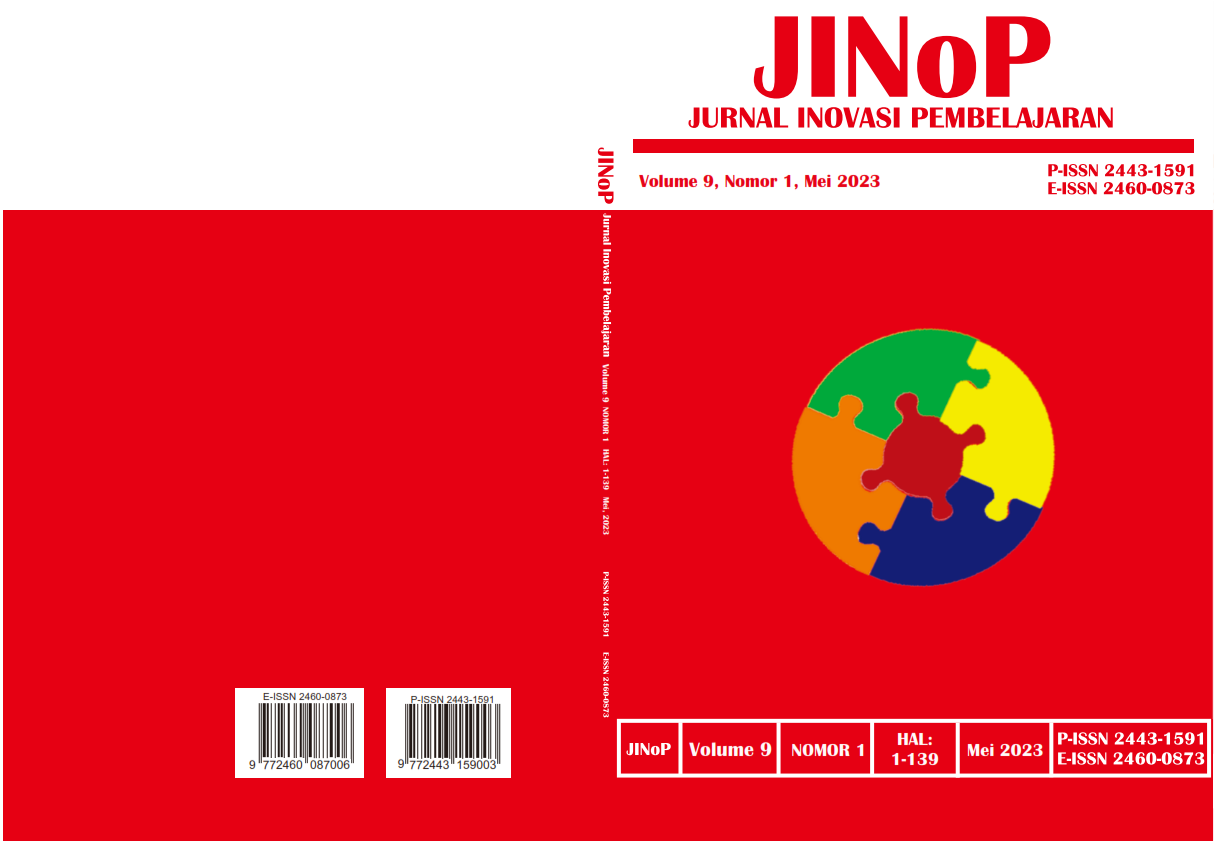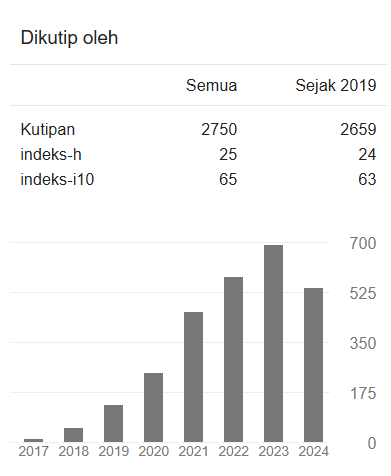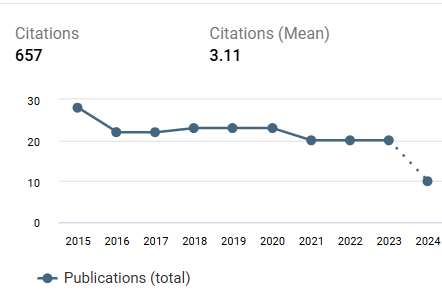Implementation and challenges of project-based learning of STEAM in the university during the pandemic: A systematic literature review
DOI:
https://doi.org/10.22219/jinop.v9i1.25177Keywords:
Project-Based Learning, STEAM, PandemicAbstract
To achieve the intended educational outcome, a learning model that puts a focus on student-centered learning must be is implemented. According to investigations of university education, lecturers still dominate the learning process, and students' critical thinking skills are still insufficient. Using STEAM in Project-Based Learning (PjBL) is one method for fostering 21st-century skills. STEAM is an acronym for science, technology, engineering, art, and mathematics. STEAM is a term that was coined after incorporating art into the STEAM teaching component. This research aims to examine the implementation and challenges of Project-Based Learning of STEAM at the university during the pandemic. This research employs literature review as its method. Furthermore, within the method it uses several national and international publications that contain theoretical or verifiable information. An organized and comprehensive examination of the publications is discussed in order to investigate the impact of STEAM-integrated project-based learning on the development of 21st-century qualifications. The results showed that the implementation of STEAM-integrated Project-Based Learning fosters students' development of 21st-century skills. STEAM-integrated PjBL allows students a hands-on learning chance to apply the topics they have studied in a project activity by fusing many domains of study. Through the learning activities, students can put their communication, scientific literacy, critical thinking, creative thinking, and scientific process abilities into practice
Downloads
References
Abdul Bujang, S. D., Selamat, A., Krejcar, O., Maresova, P., & Nguyen, N. T. (2020). Digital learning demand for future education 4.0-case studies at Malaysia education institutions. Informatics, 7(2). https://doi.org/10.3390/informatics7020013
Adlina, N. (2022). Inovasi Pembelajaran di Masa Pandemi COVID-19 dengan Pendekatan STEAM di Era Society 5.0. JURNAL SYNTAX IMPERATIF : Jurnal Ilmu Sosial Dan Pendidikan, 2(6). https://doi.org/10.36418/syntax-imperatif.v2i6.134
Arikunto. (2019). Metodelogi Penelitian, Suatu Pengantar Pendidikan. In Rineka Cipta, Jakarta.
Arsy, I., & Syamsulrizal, S. (2021). PENGARUH PEMBELAJARAN STEAM (Science, Technology, Engineering, Arts, and Mathematics) TERHADAP KREATIVITAS PESERTA DIDIK. Biolearning Journal, 8(1). https://doi.org/10.36232/jurnalbiolearning.v8i1.1019
Awang, Z., Yakob, N., Hamzah, A., & Talling, M. M. (2020). Exploring steam teaching in preschool using fred rogers approach. International Journal of Evaluation and Research in Education, 9(4). https://doi.org/10.11591/ijere.v9i4.20674
Bagheri, M., Ali, W. Z. W., Abdullah, M. C. B., & Daud, S. M. (2020). Effects of Project-based Learning Strategy on Self-directed Learning Skills of Educational Technology Students. Contemporary Educational Technology, 4(1). https://doi.org/10.30935/cedtech/6089
Bonfield, C. A., Salter, M., Longmuir, A., Benson, M., & Adachi, C. (2020). Transformation or evolution?: Education 4.0, teaching and learning in the digital age. Higher Education Pedagogies, 5(1). https://doi.org/10.1080/23752696.2020.1816847
Boytchev, P., & Boytcheva, S. (2020). Gamified evaluation in STEAM for higher education: A case study. Information (Switzerland), 11(6), 1–19. https://doi.org/10.3390/info11060316
Bush, S. B., & Cook, K. L. (2016). Constructing authentic and meaningful STEAM experiences through university, school, and community partnerships. Journal of STEM teacher education, 51(1), 7.
Direktorat Sekolah Menengah Pertaja. (2021). STEAM: Pendekatan Pembelajaran Guna Mengembangkan Keterampilan Abad 21. Ditsmp.Kemdikbud.
Garcia, A. L., Prat, J., Alier, M., Alcober, J., & Lopez, D. (2021, October). The Effect of the Covid-19 Epidemic on the Self-Perception of Training Needs in STEAM Lecturers. In 2021 IEEE Frontiers in Education Conference (FIE) (pp. 1-5). IEEE. https://doi.org/10.1109/FIE49875.2021.9637259
Gunawan, P., Ernawati, A., Hasnawati, Amrullah, F., & Asmar, S. (2020). Model Pembelajaran Steam ( Science , Technology , Engineering , Art , Mathematics ) Dengan Pendekatan Saintifik. Buku.
Hawari, A. D. M., & Noor, A. I. M. (2020). Project Based Learning Pedagogical Design in STEAM Art Education. Asian Journal of University Education, 16(3), 102–111. https://doi.org/10.24191/ajue.v16i3.11072
Herro, D., Quigley, C., Andrews, J., & Delacruz, G. (2017). Co-Measure: developing an assessment for student collaboration in STEAM activities. International Journal of STEM Education, 4(1). https://doi.org/10.1186/s40594-017-0094-z
Mahyoob, M. (2020). Challenges of e-Learning during the COVID-19 Pandemic Experienced by EFL Learners. Arab World English Journal, 11(4), 351–362. https://doi.org/10.24093/awej/vol11no4.23
Mejias, S., Thompson, N., Sedas, R. M., Rosin, M., Soep, E., Peppler, K., Roche, J., Wong, J., Hurley, M., Bell, P., & Bevan, B. (2021). The trouble with STEAM and why we use it anyway. Science Education, 105(2). https://doi.org/10.1002/sce.21605
Milara, I. S., & Cortés, M. (2019). Possibilities and challenges of STEAM pedagogies. March 2020. https://doi.org/10.13140/RG.2.2.28652.31360
Mital’, D., Dupláková, D., Duplák, J., Mital’ová, Z., & Radchenko, S. (2021). Implementation of Industry 4.0 Using E-learning and M-learning Approaches in Technically-Oriented Education. TEM Journal, 10(1). https://doi.org/10.18421/TEM101-46
Nuragnia, B., Nadiroh, & Usman, H. (2021). Pembelajaran Steam Di Sekolah Dasar : Implementasi Dan Tantangan. Jurnal Pendidikan Dan Kebudayaan, 6(2), 187–197. https://doi.org/10.24832/jpnk.v6i2.2388
Pasani, C. F., & Amelia, R. (2021). Introduction of the integrative STEAM approach as a learning innovation in the COVID-19 pandemic in South Kalimantan. In Journal of Physics: Conference Series (Vol. 1832, No. 1, p. 012029). IOP Publishing. https://doi.org/10.1088/1742-6596/1832/1/012029
Perignat, E., & Katz-Buonincontro, J. (2019). STEAM in practice and research: An integrative literature review. Thinking Skills and Creativity, 31. https://doi.org/10.1016/j.tsc.2018.10.002
Priantari, I., Prafitasari, A. N., Kusumawardhani, D. R., & Susanti, S. (2020). Improving Students Critical Thinking through STEAM-PjBL Learning Pembelajaran STEAM-PjBL untuk Peningkatan Berpikir Kritis. Bioeducation Journal, 4(2).
Pugar, Q. H., Haristiani, N., & Herniwati. (2022). STEAM Project Based Learning in Enhancing Japanese Speaking Skill in Online Classrooms. Proceedings of the Fifth International Conference on Language, Literature, Culture, and Education (ICOLLITE 2021), 595(Icollite), 548–554. https://doi.org/10.2991/assehr.k.211119.085
Puspaningtyas, M., Sulastri, S., & Sulikah, S. (2022). Collaborating Project-Based Learning and Steam Practices at Indonesia ’ s Universities Using Technology Support System. 659, 602–606.
Salsabila, N., & Muhid, A. (2021). Efektivitas Pendekatan STEAM Berbasis Parental Support untuk Meningkatkan Kreativitas Anak Belajar Dari Rumah selama masa Pandemi Covid-19. Jurnal Ilmiah Profesi Pendidikan, 6(2). https://doi.org/10.29303/jipp.v6i2.194
Sastre-Merino, S., Nuñez, J. L. M., Pablo-Lerchundi, I., & Nufiez-del-Rio, C. (2020). Training STEAM educators in the COVID-19 emergency situation: Redesigning teaching. In 2020 Sixth International Conference on e-Learning (econf) (pp. 72-75). IEEE. https://doi.org/10.1109/econf51404.2020.9385461
Simonton, K. L., Layne, T. E., & Irwin, C. C. (2021). Project-based learning and its potential in physical education: an instructional model inquiry. Curriculum Studies in Health and Physical Education, 12(1), 36–52. https://doi.org/10.1080/25742981.2020.1862683
Stanley, T. (2018). Authentic learning: real-world experiences that build 21st-century skills. Waco, TX: Prufrock Press, Inc.
Sugiyono. (2019). Metode Penelitian Kuantitatif, Kualitatif, dan R&D (1st ed.). Penerbit Alfabeta.
Suryaningsih, S., & Ainun Nisa, F. (2021). Kontribusi STEAM Project Based Learning dalam Mengukur Keterampilan Proses Sains dan Berpikir Kreatif Siswa. Jurnal Pendidikan Indonesia, 2(6). https://doi.org/10.36418/japendi.v2i6.198
Zayyinah, Z., Erman, E., Supardi, Z. A. I., Hariyono, E., & Prahani, B. K. (2022). STEAM-Integrated Project Based Learning Models: Alternative to Improve 21st Century Skills. Proceedings of the Eighth Southeast Asia Design Research (SEA-DR) & the Second Science, Technology, Education, Arts, Culture, and Humanity (STEACH) International Conference (SEADR-STEACH 2021), 627, 251–258. https://doi.org/10.2991/assehr.k.211229.039
Downloads
Published
How to Cite
Issue
Section
License
Copyright (c) 2023 Sukmawati et al

This work is licensed under a Creative Commons Attribution 4.0 International License.
Copyright Notice
Authors who publish with JINoP (Jurnal Inoasi Pembelajaran) agree to the following terms:
- For all articles published in the JINoP (Jurnal Inovasi Pembelajaran), copyright is retained by the authors. Authors give permission to the publisher to announce the work with conditions. When the manuscript is accepted for publication, the authors agree to the automatic transfer of the publishing right to the publisher.
- Authors retain copyright and grant the journal the right of first publication with the work simultaneously licensed under a Creative Commons Attribution 4.0 International License. that allows others to share the work with an acknowledgment of the work's authorship and initial publication in this journal.
- Authors are able to enter into separate, additional contractual arrangements for the non-exclusive distribution of the journal's published version of the work (e.g., post it to an institutional repository or publish it in a book), with an acknowledgment of its initial publication in this journal.
- Authors are permitted and encouraged to post their work online (e.g., in institutional repositories or on their website) prior to and during the submission process, as it can lead to productive exchanges, as well as earlier and greater citation of published work (See The Effect of Open Access).








